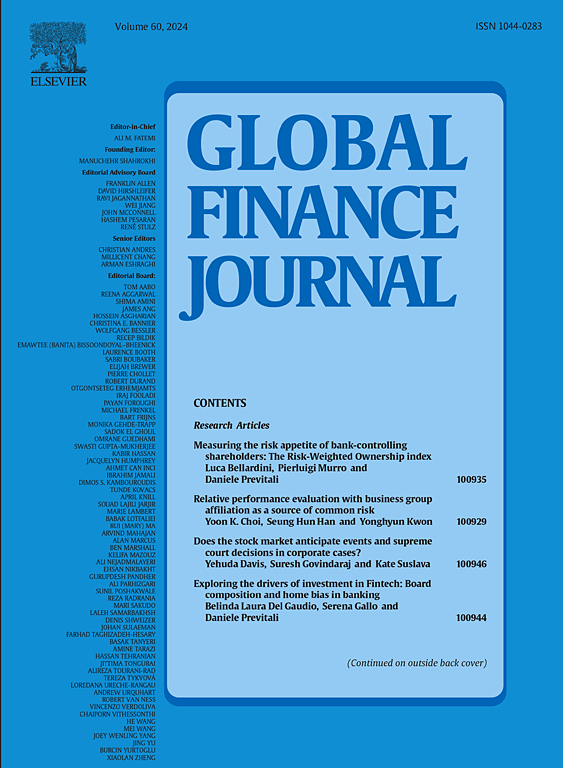撒哈拉以南非洲的金融结构和经济效率
IF 5.5
2区 经济学
Q1 BUSINESS, FINANCE
引用次数: 0
摘要
金融系统在促进经济增长方面的效率仍然是一个重大问题,特别是在撒哈拉以南非洲,那里的金融市场和机构表现出结构性弱点。现有文献主要关注以银行为基础的金融体系和以市场为基础的金融体系之间的二分法,忽视了不同金融机构的相对贡献。利用2006年至2017年22个撒哈拉以南非洲国家的数据,我们研究了银行、股票市场、小额信贷、信用合作社和信用合作社、其他存款机构以及非居民银行在提高经济效率方面的作用。采用广义矩法,我们发现存款机构发挥了最实质性的影响,而股票市场投资在推动经济表现方面的效果是银行贷款的两倍。此外,我们的研究结果表明,银行活动对股票市场和存款机构都是互补的,但我们观察到股票市场和存款机构之间没有显著的关系。这些发现挑战了将市场金融体系与银行金融体系区分为经济增长主要因素的传统观念。相反,我们认为金融体系内机构的构成和相互作用对于促进经济效率更为重要。这项研究为政策制定者和金融从业者提供了有价值的启示,强调需要关注制度动态,而不仅仅是金融体系的结构类型。通过加强我们对这些关系的理解,我们的发现有助于对新兴市场金融发展和经济表现的更广泛讨论。本文章由计算机程序翻译,如有差异,请以英文原文为准。
Financial structure and economic efficiency in Sub-Saharan Africa
The efficiency of financial systems in fostering economic growth remains a critical concern, particularly in Sub-Saharan Africa, where financial markets and institutions exhibit structural weaknesses. Existing literature predominantly focuses on the dichotomy between bank-based and market-based financial systems, overlooking the relative contributions of different financial institutions. Using data from 22 Sub-Saharan African countries from 2006 to 2017, we examine the role of banks, stock markets, microfinance, credit unions and credit cooperatives, other deposit takers, and non-resident banks in enhancing economic efficiency. Employing the generalized method of moments, we find that deposit-taking institutions exert the most substantial impact, while investments in stock markets are twice as effective as bank loans in driving economic performance. Additionally, our results indicate that banking activities complement both stock markets and deposit-taking institutions, but we observe no significant relationship between stock markets and deposit takers. These findings challenge the conventional wisdom that distinguishes between market-based and bank-based financial systems as primary factors for economic growth. Instead, we argue that the composition and interaction of institutions within the financial system are more critical for fostering economic efficiency. This study provides valuable implications for policymakers and financial practitioners, emphasizing the need to focus on institutional dynamics rather than merely the structural type of financial system. By enhancing our understanding of these relationships, our findings contribute to the broader debate of financial development and economic performance in emerging markets.
求助全文
通过发布文献求助,成功后即可免费获取论文全文。
去求助
来源期刊

Global Finance Journal
BUSINESS, FINANCE-
CiteScore
7.30
自引率
13.50%
发文量
106
审稿时长
53 days
期刊介绍:
Global Finance Journal provides a forum for the exchange of ideas and techniques among academicians and practitioners and, thereby, advances applied research in global financial management. Global Finance Journal publishes original, creative, scholarly research that integrates theory and practice and addresses a readership in both business and academia. Articles reflecting pragmatic research are sought in areas such as financial management, investment, banking and financial services, accounting, and taxation. Global Finance Journal welcomes contributions from scholars in both the business and academic community and encourages collaborative research from this broad base worldwide.
 求助内容:
求助内容: 应助结果提醒方式:
应助结果提醒方式:


